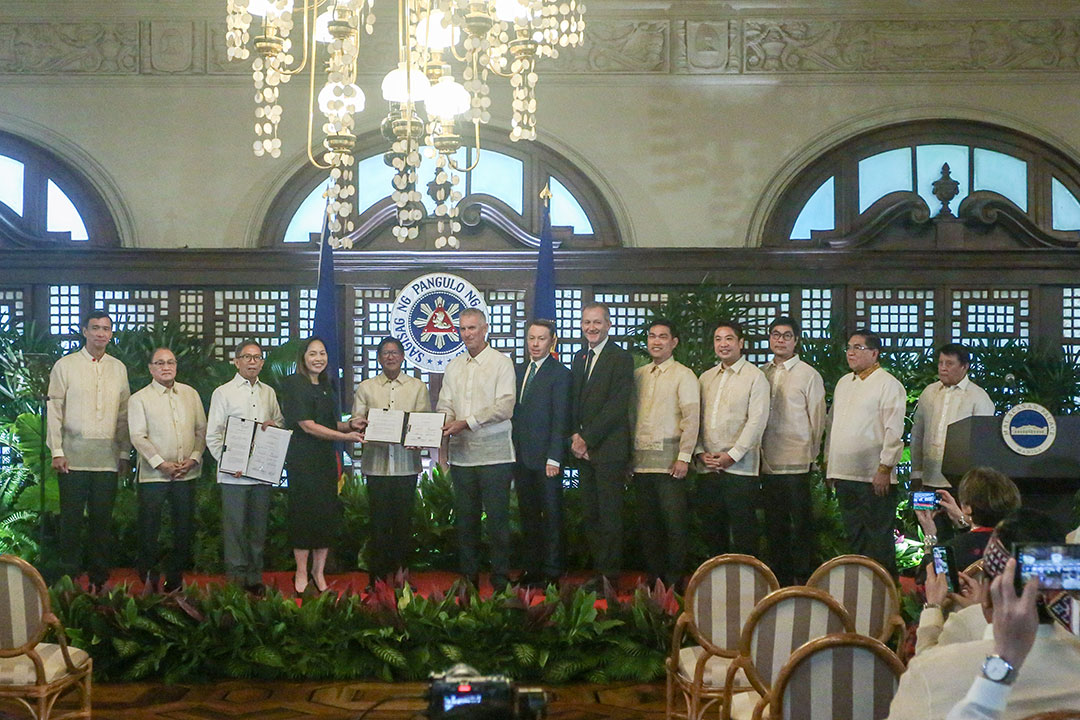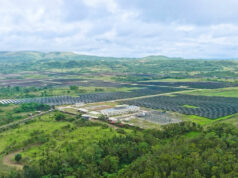Marcos inks new energy deals, hopes to reduce PHL dependence on oil imports

By Sheldeen Joy Talavera, Reporter
PRESIDENT Ferdinand R. Marcos, Jr. on Wednesday signed eight new petroleum service contracts (PSCs), representing a potential investment of around $207 million (around P12 billion) over a seven-year exploration period.
The Department of Energy (DoE) said the awarding of these service contracts (SC) means that exploration for potential petroleum and hydrogen sources in key areas across the Sulu Sea, Cagayan, Cebu, Northwest Palawan, East Palawan, and Central Luzon can now begin.
“Unlocking over $200 million in investments, these service contracts represent our continued efforts to attain greater energy security, and therefore, economic stability, and self-reliance,” Mr. Marcos said in his speech during the official presentation of the signed agreements at Malacañan Palace.
The Philippines is a major importer of petroleum products, which are primarily sourced from the Middle East.
Mr. Marcos said the country imported over 340,600 barrels of liquid fuel last year, equivalent to approximately 99.68% of the Philippines’ entire petroleum supply.
To reduce dependence on imported oil and increase the utilization of indigenous resources, the Philippines also explores the potential of hydrogen as an alternative fuel.
“These service contracts signify not only our determination to secure new energy sources, but also our readiness to embrace innovation and sustainability while reducing import dependence,” said Energy Secretary Sharon S. Garin.
“From conventional petroleum to native hydrogen, we are expanding the frontiers of Philippine energy exploration,” she added.
Asked about the potential interference by China in the contracted areas, specifically those located in west of Palawan, the Energy chief said that all projects are well coordinated with the Department of National Defense “whether near the disputed areas or not.”
The DoE said that all the awarded contracts have undergone a transparent and competitive selection process under the Philippine Conventional Energy Contracting Program.
PSC Nos. 80 and 81 located in the southern Sulu Sea were awarded to a consortium comprising of Australia’s Triangle Energy (Global) Limited, United Kingdom’s Sunda Energy Plc., Pangilinan-led PXP Energy Corp. and The Philodrill Corp.
PSC 80 spans about 780,000 hectares, while PSC 81 covers 532,000 hectares. These contracts will be co-managed by the DoE and the Ministry of Environment, Natural Resources, and Energy of the Bangsamoro Autonomous Region in Muslim Mindanao.
Separately, PSC No. 82 was awarded to Triangle Energy, allowing it to proceed with petroleum exploration across 480,000 hectares in Cagayan basin.
For native hydrogen exploration in Central Luzon, the government awarded PSC Nos. 83 and 84 to US-based Koloma, Inc. SC 83 covers 126,645 hectares while SC 84 covers 85,082 hectares.
Gas 2 Grid Pte. Ltd. secured PSC No. 85 to explore 127,475 hectares in onshore Cebu.
A consortium of Filipino companies composed of Philodrill, Anglo Philippine Holdings Corp., PXP Energy, and Forum Energy Philippines Corp. received PSC No. 86, which covers 132,000 hectares in the Northwest Palawan Basin.
Situated in the East Palawan Basin, PSC No. 87 was awarded to Israel’s Ratio Petroleum Ltd.
With contracts in place, the companies can commence their respective work programs, which include geological and geophysical studies, seismic surveys, and drilling activities, as appropriate, to assess the potential of the contract areas.
Aside from exploration, service contractors will fund and undertake educational scholarships, capacity-building, and community development programs.
Edgar Benedict C. Cutiongco, president of the Philippine Petroleum Association, said that the PSCs unlock the potential of indigenous hydrocarbon resources to offer “a cost-effective and competitive energy supply” for consumers.
He said that reducing reliance on imported fuels “directly contributes to price stability and economic resilience.”
“The timely execution of these PSCs is expected to catalyze exploration and discovery activities, ensuring a reliable and secure energy supply for the future,” Mr. Cutiongco told BusinessWorld.
“The success of these initiatives will depend on the industry’s collective commitment to responsible and efficient resource development.”
Former Energy Undersecretary Jose M. Layug, Jr. said that the signing of eight PSCs is “a good signal for revival of oil and gas exploration in the Philippines.”
The President has urged investors to leverage their investments to drive meaningful progress for the Philippines.
“In return, I encourage our investors to turn your investments into engines of progress. Operate with accountability, with respect for the environment, and fairness towards the communities that host your operations,” Mr. Marcos said.
“Let us prove that responsible enterprise and national development can go hand-in-hand — that growth built on transparency and responsibility is growth that will last,” he added.



